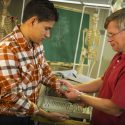UW-Madison deepens Posse relationship
The University of Wisconsin–Madison will deepen its relationship with the Posse Foundation this coming year with the addition of a fourth recruitment city — New York — and by joining the Posse Foundation’s science-focused effort.
UW-Madison was the first public institution to partner with the national organization, which focuses on recruiting and supporting “posses” of underrepresented scholars from the nation’s urban centers at higher education institutions. The newest recruits from New York will join UW–Madison Posse scholars from Chicago, Los Angeles and Washington, D.C.
“We’re pleased to be Posse’s most prominent strategic partner,” says Damon A. Williams, UW–Madison vice provost for diversity and climate. “That includes the new STEM Posse.”
As one of the nation’s leading research and science institutions, UW–Madison will take a leading role in defining how the country takes its efforts to diversify and improve America’s ranking in the international science fields developing around science, technology, engineering and mathematics to the next level, says Williams.
To be selected for the new STEM-focused Posse, students were screened for their interest in science and its application in the real world, Williams says. UW–Madison also will work toward further helping undergraduates perform at a level that leads to success, degree attainment and graduate studies in preparation for employment and research.
Although much of the programming for STEM Posses and regular Posses is identical, the STEM Posses will also participate in a science exploration program on the UW–Madison campus the summer before they matriculate full time, Posse president and founder Deborah Bial says. This past fall, UW–Madison hired its first full-time Posse leader, interim director Albert Muniz, the former director of business undergraduate recruitment and admissions in the Undergraduate Admissions Office of the Wisconsin School of Business.
In addition to preparing for its first STEM Posse, the program is working to better serve Posse scholars and work toward university goals such as reducing the time it takes to complete an undergraduate degree. Departments across the campus are invested in the success of the campus’s newest Posse venture, Williams says.
“We have a number of departments on campus that are focused on diversifying the ranks of students in STEM areas, including the College of Engineering, which has established the Louis Stokes Alliance for Minority Participation, and the Center for Academic Excellence in the College of Letters & Science, which is working proactively to identify and replicate best practices in instruction and advising.”
The new STEM Posse also will benefit from an advising board designed to tap the expertise of faculty and staff on how to grow and strengthen the project, Williams says.
Progress in the STEM fields is critical to the nation’s health and to our standing in the international community, Bial says.
“Our goal is to help ensure that as our country becomes increasingly diverse, that diversity is reflected at the highest levels in all professional fields, including STEM,” she says. “Partnerships like the ones between UW–Madison and Posse help guarantee that there is a pipeline for young leaders, from diverse backgrounds going into those fields.”
Williams says that the need to remain a powerful competitor in the global science and science education race is an international issue.
“In the new economy, scientific innovation will be essential to providing new jobs and creating solutions to the world’s challenges,” Williams says. “The STEM Posse is helping to to diversify the works of scholars that engaging in that work. Diversity among the members of science and research teams is key to building new solutions and thinking creatively and finding new answers to pressing and difficult science problems.”
“We are thrilled with the UW-Posse partnership. UW–Madison is the only one of Posse’s 38 partner institutions to take four Posses each year,” Bial says. “This clear investment in these young leaders is so exciting and will make a significant contribution to the future generation of decision-makers, innovators and policymakers in this country.”
Founded in 1989, Posse is one of the nation’s most comprehensive college access, diversity, and youth leadership development programs. The program recruits, selects and trains public high school students and sends them to college in multicultural teams of 10 to be a support network and to be catalysts of change on campus.
The Science Posse Program, established to select and support students in the science, technology, engineering and mathematics (STEM) topic areas, was piloted at Brandeis University in the fall of 2007 the first cohort was recruited, according to Bial. They enrolled at Brandeis in 2008.
Bial says the foundation is excited to work with UW–Madison on the project.
“UW-Madison has been an extraordinary partner over the years, effectively recruiting and supporting Posses from three different cities and now a fourth,” Bial says. “This, combined with Chancellor Biddy Martin’s leadership and commitment to diversity, and the excellence of the UW undergraduate programs in the STEM fields gives us great confidence that the UW STEM Posse will be successful.”
Posse’s science-focused cohorts began as a collaboration with Irv Epstein, a chemistry professor at Brandeis, who was awarded a grant from the Howard Hughes Medical Institute in 2006 to improve science education and increase interest in the field among underrepresented students.
Tags: diversity, School of Education

